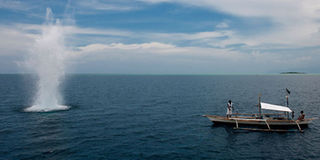Can dynamite fishing be stopped in Tanzania?

Lindi Region has been recorded to have an average of ten dynamite blasts a day
What you need to know:
Mr Rubens, the director of Sound Ocean Ltd, a marine environment organisation, said blast-fishing is practiced in 16 mainland coastal districts and municipalities with Dar es Salaam, Tanga, Mtwara and Lindi coastal areas cited as hotspots due to lack of regulation.
Tanga. A marine scientist, Mr Jason Rubens, today made damning revelations on the extent of dynamite fishing in some coastal areas of Tanzania, saying the resurgence of blast-fishing has been driven by the availability of illegally-traded industrial explosives and detonation materials, in part, imported for use in the mining sector.
Mr Rubens, the director of Sound Ocean Ltd, a marine environment organisation, said blast-fishing is practiced in 16 mainland coastal districts and municipalities with Dar es Salaam, Tanga, Mtwara and Lindi coastal areas cited as hotspots due to lack of regulation.
Mr Rubens reported that beach management units (BMUs), with support from WWF, monitored blast frequency at Songosongo in Lindi region for 15 months up to late October 2014 and recorded 8,765 blasts with an average of 21 blasts a day.
He added that more monitoring done at Mgao in Mtwara region for nine months ending April 2014 found a total of 2,683 blasts with an average of 10 blasts a day.
Mr Rubens, also a marine environmental consultant with WWF, the world’s leading conservation organization, was speaking at a seminar organized by the National Environment Management Council (NEMC) and supported by WWF Tanzania.
They said coral reefs were highly adapted to live and grow slowly and when damaged reefs took many years to recover any in some incidents they never recovered at all.
Dr Muhando and Ms Mtui said reefs provided many useful goods and services, adding that coastal livelihoods was highly dependent on coral reefs,
They said blast fishing demolished the coral framework, reduced the complex three dimensional topography to rubbles, denying living habitats for millions of reef organisms, and disrupting provision of all services and goods.
The two scientists said coral reef destruction was associated with low fish productivity and rampant poverty and they called for the protection of coral reefs for the prosperity of the nation.




